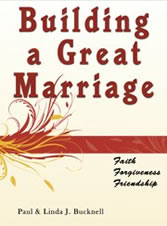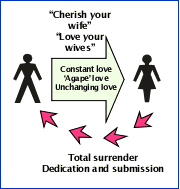
Building a Great Marriage
Developing Trust & Intimacy in Marriage
Session #9
Paul and Linda J. Bucknell
Building a Great Marriage Index:
Faith: #1 Hope | #2 Love | #3 Submission | #4 Oneness
Forgiveness: #5 Conflict | #6 Crises | #7 Forgiveness
Friendship: #8 Intimacy | #9 Trust | #10 Love works!
The Need for Trust | Triad #1 The Path of Love | Triad #2 The Path Toward Intimacy
Marriage Study Questions
Resolving Marital Crises & Avoiding Conflict
Purpose: Developing Trust & Intimacy shows us the important place trust plays in a growing marriage and the means to securing a growing trust as seen through the Song of Songs. This is part #9 of the larger series 'Building a Great Marriage!'
No book has affected my life more than the Song of Solomon.
 For any book to so impact a person’s life is good but rare. Usually, a book ends with its reading. God’s Word, however, provides an unending mine of riches enabling us to dig for whatever we need. Song of Solomon contains nuggets of gold that unlock the mystery of love and trust. These nuggets are the keys to a growing marriage.
For any book to so impact a person’s life is good but rare. Usually, a book ends with its reading. God’s Word, however, provides an unending mine of riches enabling us to dig for whatever we need. Song of Solomon contains nuggets of gold that unlock the mystery of love and trust. These nuggets are the keys to a growing marriage.
In other Bible books, we have commands and illustrations that tell us how to have a good marriage. If we would obey them, we would do well.
But there are things that keep us from having confidence in those commands that they really work. We shouldn’t have this perspective, but many do. They are the same people who point out all the problems occurring in the marriages around them.
A. The Need of Trust
 There are so many marriage problems surfacing that one wonders how the world has endured this long. Each week I am made aware of another layer of significant marital difficulties in the people around me. Your experience is probably similar. I would have suffered the same condition had it not been for the power of God’s Word that was revealed during times of meditation on this book. I wasn’t planning to study the Song of Solomon but at the last minute in January 1975, thanks to the prompting of the Spirit of God, I did. My life has been greatly changed.
There are so many marriage problems surfacing that one wonders how the world has endured this long. Each week I am made aware of another layer of significant marital difficulties in the people around me. Your experience is probably similar. I would have suffered the same condition had it not been for the power of God’s Word that was revealed during times of meditation on this book. I wasn’t planning to study the Song of Solomon but at the last minute in January 1975, thanks to the prompting of the Spirit of God, I did. My life has been greatly changed.
I must admit not all the changes and impact came immediately, but what will be shared below are the truths that set a foundation by which all the changes could be made. Maybe you wonder what is it that made such a difference in my life.
 I suppose it has to do with a change in how I look at myself. Everyone wants acceptance, and I was no different. Relationships enable a person to see himself from a different perspective. Loving relationships enable a person to look through the other person’s eyes at his own life and get a more accurate picture.
I suppose it has to do with a change in how I look at myself. Everyone wants acceptance, and I was no different. Relationships enable a person to see himself from a different perspective. Loving relationships enable a person to look through the other person’s eyes at his own life and get a more accurate picture.
I never learned about warmth and acceptance growing up. Divorce, bitterness and criticism left me emotionally crippled. I couldn’t easily relate to others, and I faced a number of problems including stammering. These problems are becoming more common in children as more marriages are going downhill.
The Song of Solomon came into my life like a breath of fresh air. Helping to unlock the ideas in that book was a girlfriend that I had and clung to. I was desperate for her smile. I can see why I thrived under the light of her warm smile. It was acceptance. It was the same truth that God began to vividly teach me in the scriptures–God’s love.
The question was how was I going to get this knowledge of love into me. It was there, but the voices telling me that I was unwanted and inadequate were interfering. Of course when you feel that way about yourself, you are afraid to expose your true self to others.
What usually happens, and would have happened to me, is that my responses would have been so self-absorbed by my perception of myself that I would have destroy any relationship that I would become involved in. And this is what happens to many children who are brought up under bad marriages.
Only God’s grace and wisdom has kept me from being another statistic. Let me go on and share how He did this. I may be oversimplifying the process, but the keys that unlocked certain doors of understanding in my life ushered me into places I never would otherwise have been able to reach. You can use these keys too. Let’s first pray.
“Dear Lord, would you please break through our stubborn and blind hearts. We don’t deserve your love. We can’t even understand it. Much like the sun, it is so bright that we have put on sunglasses and keep out of its light. We have learned to live in the shadows of darkness rather than the glories of your love. Bring us close, dear Lord, bring us closer to you that we in turn could have great marriages. In Christ’s Glorious Name we pray, Amen."

The Song of Solomon played a key role in changing my life. There are certain verses that God used to show me that I was loved and accepted. When a child grows up with criticism and bitterness, he does not really know what love is. This child has an inner life of bitter secrets and angry solitude. Things might appear to be fine on the outside, but there are problems within. These problems will become more apparent in relationships with others and especially in marriage.
 The Song of Solomon has two sets of three verses that describe love and trust that is growing. The first triad is taken from the first section (1:1-3:5) of the book. It discusses the courtship or budding romance of the couple. The second triad is spread over the whole of the Book of Solomon. One verse is in both triads.
The Song of Solomon has two sets of three verses that describe love and trust that is growing. The first triad is taken from the first section (1:1-3:5) of the book. It discusses the courtship or budding romance of the couple. The second triad is spread over the whole of the Book of Solomon. One verse is in both triads.
Part of the powerful way God injected me with these truths was through the fact that our relationship with Him parallels the relationship of a man and woman who meet, enter marriage and live together as one.
At this point in my life I loved God with an inferior love. I also held deep hopes of marrying once out of college. Each verse of the triad unlocks certain key perspectives that are needed in a growing and intimate relationship. This is true both with the Lord as well as with our mate. Let’s take a look at them.
|
B) Triad #1: The Path of Trust
We will find this triad of verses in 1:5, 2:1 and 2:16. Each statement is a reflection of the bride-to-be. She is reflecting on herself in light of his love for her, though it seems that in 1:5 and 2:16 he was not actually there in her presence. Men might feel a little awkward learning from the bride. They think, “I’m no bride” and simply turn off. But hold on.
Remember that this book is written from both a spiritual and physical perspective. In this case, then, when the bride is speaking think of yourself as the bride of Christ. The man, loving the woman, represents Christ showing His love for the church. The bride-to-be represents all Christians. As Ephesians 5 says, the church is the bride of Christ. This will help us cross some gender gaps that would otherwise keep these truths from seizing our hearts.
Accepted > Valued > Belonging
1) Accepted (Song of Solomon 1:5)
"I am black but lovely, O daughters of Jerusalem, Like the tents of Kedar, Like the curtains of Solomon. Do not stare at me because I am swarthy, For the sun has burned me. My mother’s sons were angry with me; They made me caretaker of the vineyards, But I have not taken care of my own vineyard" (Song of Solomon 1:5-6).
The key phrase is, “I am black but lovely.” Through these words and the following explanation we see her early perception of herself. In the following verses we will trace her growing perception of herself.
I carefully use the word ‘perception’ because what we believe about ourselves is not always true. For example, we are sinners but many people deny it. On the other hand, we might feel clumsy and lonely and yet are valuable creatures designed with a purpose. What I perceive about myself is often not true. It is the truth of God that sets us free. His perception of us is what is right and real. It is these truths that we need to acquire. The question is “How?”
Perception
|
|
Perception of Self |
God’s Perception of Us |
Wrong: We believe that we are not that bad. Wrong: We feel clumsy, rejected and lonely. |
Right: We are totally unacceptable before God because of our sin. Right: As valuable creatures we are designed with a purpose. |
Many Christians have heard about the love of God but seem untouched by it. They think they deserve God’s love. They get angry at events in their lives that seem to cast doubt on God’s love for them. These are the people that are very different from this maiden. They would not say ‘I am black but lovely,’ but ‘I am fair and lovely.’ I had no problem with that. God had revealed in a vision my horrible selfishness and sins. Later, He showed me in His Word how accurate that perspective was.
There are two approaches to self-understanding. They make a key difference in a person’s life. Jesus starts off with the same approach in His famous ‘Sermon on the Mount,‘
“Blessed are the poor in spirit” (Matthew 5:3).
Whether or not we accept ourselves greatly shapes how we approach life. She openly admitted how ‘tarnished’ she looked. Her skin was burnt due to working hard in the vineyards. She did not have the means to protect her skin by being brought up in the palace, but being of lower class she worked hard outside. And even more specifically, she was the lowest in the family because she did the hard work herself. In a spiritual sense the ‘dark’ represents her unworthiness to be loved by Christ due to her sin.
"Do not stare at me because I am swarthy, For the sun has burned me. My mother’s sons were angry with me; They made me caretaker of the vineyards."
In order to flush out the real meaning of these two views of acceptance, let us look at the differences side by side.
Godly view“I am dark but lovely.” Humility: Recognizes one’s own faults. Undeserving: Appreciative of attention because it is not thought to be deserved. Source of attention is outside self. Retainable: Independent of one’s beauty, age or gifts; it is because she is chosen. Secure: Does not seek for affirmation but delights in and is thankful for received affection. |
Secular view“I am fair and lovely.” Superficial: Focus is on self; less intimate because more independent. Deserving: Attention and adoration is to be expected because the source is inside oneself. Able to be lost: Is dependent on temporal, fading things. Insecurity: Seeks affirmation; anxious if not received because the relationship depends on the temporal. |
All relationships start off superficial. The guy and gal are just getting to know each other in the beginning. As the couple gets better acquainted, however, the relationship ought to become more deep and personal. They should reveal intimate things of their hearts. When a person starts a relationship with the belief that a person’s attention to her is dependent upon something she is or has, then that relationship stays very superficial.
As a result of this, the person cannot focus on serving the other but must constantly figure out ways to get attention and affirmation. Because the relationship is not perceived to be founded on unconditional acceptance, it seems shaky. As long as the relationship is perceived as unstable, then all the energy goes to protecting it. Petty jealousies, demand for time, gifts suspicious attitudes are a few evidences of this.
Insecure relationships therefore cause ‘perpetual crises’ characterized by fears, worries and superficial relationships. It wears the body and the relationship down. It does not foster the vulnerability needed for mutual trust. The friendship is awkward and can never penetrate the superficial. The basic underlying reason for this guarded approach is to secure the relationship as much as possible.
The person dares not fully reveal his own self for fear of rejection. Women who base their acceptance on beauty, fear age and wrinkles. Trust therefore never grows. There is no intimate sharing from which great marriages are formed.
Key elements to a growing relationship.
|
|
|
|
|
|
|
When a person starts off right, however, a whole different set of principles is set in operation. Security in the relationship results in the development of a normal trusting relationship. The person can grow as the relationship grows.
Our Christian lives need a firm foundation too. Those who are not quite clear about their sin, are never very sure of their salvation. Early discipleship training should always include instruction about our sin and the glorious and effective work of Christ Jesus. But let us turn back to our focus of acceptance here.
 She does not only say, “I am black.” She says, “I am black but lovely.” We are not to be preoccupied with our weaknesses. We are racked with problems; we are sinners, but something great has come into our lives despite our lowly origins. In the following verses we see all the maidens dancing for joy because she has been chosen. The king has set his heart on her.
She does not only say, “I am black.” She says, “I am black but lovely.” We are not to be preoccupied with our weaknesses. We are racked with problems; we are sinners, but something great has come into our lives despite our lowly origins. In the following verses we see all the maidens dancing for joy because she has been chosen. The king has set his heart on her.
This is why the commitment that is formalized in marriage is so important. The bridegroom has specially chosen her for life to bestow his full heart upon her. She is set apart despite her inferior background. Her delight comes from total acceptance in face of her flaws.
Spiritually, the same is true. The parallel relationship brings much clarity.
We are not chosen because of any good in ourselves. Solomon had many to choose from but he chose to put his favor on her (1:4b). He chose to delight in her. In a similar way, God in Christ has chosen us for Himself. He did not choose everyone. We are sinful and yet He chose us. Our salvation is not dependent upon what we do because our sin has marred everything. He has chosen the ungodly and wicked to become His special possession.
Many Christians fight the teaching of election because they do not understand their ‘blackness.’ The joy in our Christian lives starts when we can celebrate Christ’s choice of us because He desired us to be with Him for eternity.
"Blessed be the God and Father of our Lord Jesus Christ, who has blessed us with every spiritual blessing in the heavenly places in Christ, just as He chose us in Him before the foundation of the world, that we should be holy and blameless before Him. In love He predestined us to adoption as sons through Jesus Christ to Himself, according to the kind intention of His will, to the praise of the glory of His grace, which He freely bestowed on us in the Beloved" (Ephesians 1:3-6).
This is the reason the wife feels so good when she sees her husband affirming his commitment to her in different ways.
2) Valued (Song of Solomon 2:1)
"Bride-to-be: I am the rose of Sharon, The lily of the valleys" (2:1).
"Bridegroom-to-be: Like a lily among the thorns, So is my darling among the maidens" (Song of Solomon 2:2).
In between these three revelations of her self-awareness, there are lots of special words and activities going on between the couple. The couple is simply ‘in love’ during this courtship phase. As they exchange words, they grow in their intimacy. If married couples could just continue on this way, so many problems would be solved! So what is it that we discover from this woman’s response here in 2:1?
We no longer see her reminiscing about her blackness even though it is true. The fears and terrors of the past are gone. She is no longer thinking about those things that might lead to rejection. Instead she says of herself, “I am the rose of Sharon, the lily of the valleys.”
She is beginning to see herself as he sees her. She declares herself to be one of the beautiful flowers they have seen on the pathway, full of blended color and aroma. Warm with a soft touch. When a person finds acceptance, they can move on and begin to open their life for further growth. We start seeing ourselves as valuable.
This is what he sees: her value. We can see this through the next verse. She stops at describing herself as a beautiful and desirable flower. He doesn’t stop there. He brings to her mind that she is “a lily among thorns.” He affirms his delight in her. He states she is a lovely lily. But he goes beyond this and states that all around her are like thorns in comparison.
He not only states his commitment toward her but also expresses his affection for her. We see this non-stopping affection, which goes right on to the end of the book. It is not as if this man has been blind. No. There are many maidens around. Now it is one thing to hear how the maidens delight in his choice of her (1:4), but it is so much more wonderful to hear the man affirm his sole delight is in her.
How do you determine value? How do you determine which car is the best? Do you not look around? Do you not compare and see how one model stacks up to the next? In the end he will stay satisfied because he has done the shopping. This man affirms that he has looked around. The other women are like unattractive “thorns” compared her the “lily”.
She is opening up more and more of her heart. He cherishes her; she responds. Her perception develops according to the way the one who chose her sees her. Some might question whether this is true. It is true from his perspective. His commitment toward her shapes the way she thinks of herself.
Practical
Husbands need to affirm the special qualities of their wives. They love hearing how they are special in different areas. Whether it be a meal, a kind word or a smile, let her know how she specifically has been a blessing to you. When husbands express their delight in their wives, wives are able to respond with more trust. A husband’s kind and appreciative words are like the sun which cause his wife’s heart unfold more and more like a flower.
Spiritually
The Lord truly treasures us. He has not made a mistake. He has chosen us for eternity. It wasn’t because of any good in us. His simply delighted to make us His own. The key point here is that we stay His. We stay loyal. We refuse to be caught by the lure of the world. We have one more step to go in this first triad.
3) Belonging (Song of Solomon 2:16)
"My beloved is mine, and I am his" (Song of Solomon 2:16a).
The woman is chosen. He affirms that choice of her alone. These things open the way for her to see her identity wrapped up in him. If we read the verses in between step #1 and #2, we could see why she might think this way!
"My beloved responded and said to me, ‘Arise, my darling, my beautiful one, And come along. For behold, the winter is past, The rain is over and gone. The flowers have already appeared in the land; The time has arrived for pruning the vines, And the voice of the turtledove has been heard in our land" (Song of Solomon 2:10-12).
Intimacy is not a one-sided affair. In fact we will see this verse also serves as the first step of the second cycle too. Steps of true intimacy between a man and woman can only come after marriage. But in this cycle of courtship, the young lady begins to ready herself for marriage, which soon follows in the next chapter. She is not talking about beauty any more. Her reference point becomes identification with him. She sees possession and ownership.
Value is one thing but ownership is the language of commitment. After the wedding, the sealing of the commitment, there is no turning back. The trust she has developed earlier has now enveloped her life. His acceptance of her has brought her to the point of oneness.
We do not see her saying these things directly to him. She is just catching some of her pre-wedding thoughts and putting them in a bottle for keeps.
Practical
Some people wonder why the romance of their marriage is gone. We can ask whether or not there is any affection left for the spouse? When did it stop? Why? Any bitterness must to be cleaned out?
Spiritual
The Lord looks for our own commitment to Him. He ‘bought us with a price.’ There is no doubt about His commitment toward us. Jesus speaks about us being ‘in Him’ not once but over and over again. Nineteen times the phrases “in Him” or “in Christ” were used in Ephesians alone. The strength of our faith will depend on how much we actually perceive ourselves identified with Him (i.e. Christ).
"In Him, you also, after listening to the message of truth, the gospel of your salvation--having also believed, you were sealed in Him with the Holy Spirit of promise" (Ephesians 1:13).
Let us now review this first triad of verses that focuses on the development of love and trust. We see a great thrust forward in their relationship. True, it is only romantic and not tested by marriage’s time and trial. On the other hand, this pre-wedding development has enabled the couple to come to the point where they are desirous for each other and willing be with each other for life.
This time of pre-marriage romance is meant to bring out the elements that build trusting relationships in a good marriage. The couple has moved a long way toward trusting each other in order to commit themselves for life. The elements of trust include:
¨ An acceptance of each other the way they are
¨ A perpetual stream of kind words
¨ Exchanges of affectionate words
¨ A man’s selective choice of the woman
¨ A treasuring of her above all others
¨ A surrender of self to become ‘one’ with the other
In marriage we die to ourselves so that we can be faithful to the other. All other concerns must fall aside compared to this one. If this is the commitment made before the wedding, then we should have no doubts for how this trust is to grow and develop.
The seeds of trust that are planted early on must continue, even through spring showers, summer storms and bleak winters. If you can so treat and serve your spouse before your marriage, you can afterwards too. The depth of intimacy, however, can and should grow. This is what we will see in the second triad of verses.
C) Triad #2: The Path toward Intimacy
Let’s look briefly at the second triad to help us see the growth of intimacy. Do remember that intimacy can grow only as much as trust has developed. Under the man’s constant love, we find that she continues her reflections about her growing life. It would seem that the maturing of reflective thought reaches its apex in 2:16 but this clearly is not so.
The progress becomes much more refined. Only the shared years and experiences that marriage provides can take the relationship further. Let’s note the three verses. We will need to do some detective work.
“My beloved is mine, and I am his.” (Song of Solomon 2:16)
“I am my beloved’s and my beloved is mine.” (Song of Solomon 6:3)
“I am my beloved’s and his desire is for me.” (Song of Solomon 7:10)
In order to see intimacy grow to what it should be, we are going to start with a sincere commitment to each other. The bridegroom commits himself to love her unconditionally. The bride responds by trusting herself to him. She takes on his name. After the first step, that we will discuss briefly, we will note two other transformations that take place in the spouse’s minds and hearts.
(1) The Commitment: “My beloved is mine, and I am his.”
We have already shared the steps of growth that led to the commitment to trust. Some couples seem to get to this point. They start off with the wrong assumptions: intimacy is based on attraction rather than commitment, beauty rather than choice. They might seem to have a good relationship but it is paralyzed by personal sin that they do not want to recognize and deal with.
Many people are surprised at how some ‘good matches’ end up so bad. There can be many reasons, but God would want us first to check our ability to be intimate. True intimacy requires an opening up of one’s life. This in turn requires an unveiling of your own heart. You cannot have a mature marriage unless you are personally mature. Our intimacy will grow only as we grow personally.
In this case, the bride-to-be has found delight in having such a husband. She is focused on what she has found. She does acknowledge that she belongs to him but it is second in her mind. She thinks less of her ability to serve him than his ability to keep, protect and provide for her.
(2) Transformation to Devotion: “I am my beloved’s and my beloved is mine.”
 Look carefully and note what the difference is between this line and the one before it. Look carefully. It marks the first transformation needed for a married couple to have greater intimacy.
Look carefully and note what the difference is between this line and the one before it. Look carefully. It marks the first transformation needed for a married couple to have greater intimacy.
That’s right. The two concepts in the sentence have switched places. In the first statement, she sees that what she gets out of the marriage as most important. She focuses on having him. It is true of course, but it no longer her priority. For a while, she focused on what she had. This has been released. What now is most important?
“I am my beloved’s” has stepped to first place. She now focuses on her wonderful calling as his wife. The progression is natural. We find that the longer she is married and knows more deeply her husband’s love, she can deepen her own commitment to God’s calling for her. This results in a more faithful form of devotion. Proverbs 31 reminds us of the woman who has been faithful to her calling as wife. She is not so focused on what she gets but more on what she can give.
(3) Transformation to Surrender: “I am my beloved’s and his desire is for me.”
The most intense and mature kind of intimacy and trust is seen in this final phrase. What is the difference between this and the two above? Surrender marks the third transformation.
 We first see that the “He is mine” is gone. She no longer focuses on what she got-her man. Again, we should not think that she does not value him. Although a lessening of value does happen in many marriages, couples in such a circumstance would not speak these words. We must be careful to differentiate between the two.
We first see that the “He is mine” is gone. She no longer focuses on what she got-her man. Again, we should not think that she does not value him. Although a lessening of value does happen in many marriages, couples in such a circumstance would not speak these words. We must be careful to differentiate between the two.
She does not change the place of the “I am my beloved’s.” This is where it should be. What characterizes her life is her devotion to him. She belongs to him. This is the way ‘oneness’ works its way through to the practical aspects of marriage. The wife must see herself primarily as his helpmate. She is there for him. As Paul says, “The woman was made for man.” But we do see one added change here that marks this crowing intimacy.
 She rests herself in her husband’s unconditional love. She says, “His desire is for me.” This expression has come through many years of regular and constant love.
She rests herself in her husband’s unconditional love. She says, “His desire is for me.” This expression has come through many years of regular and constant love.
She is not just stating what she hopes is true. This is often said of an immature love. He is there by her side not because of sex and beauty. No. There are too many cases where he has shown his persistent faithfulness even in her moody times.
Once this thought dawns on the wife, we see a greater change come over her. She becomes totally secure and fulfilled in knowing of his love for her. It is this very love that is alluded to from Ephesians 5, “having no spot or wrinkle or an such thing; but that she should be holy and blameless.”
Love sifts out our sins because it acts as a mirror reflecting them in our faces. Our worries, fears and others sins become great stains on a beautiful tapestry. We desire for them to be gone.
The steps to intimacy are gradual but real. She would say that she knew of his love for her all along. He has expressed it a thousand times in “I love you,” but finally there is a new satisfying and fulfilling awareness that he really does love her. He has devoted himself to her for no other than reason he likes being with her. This brings her to a new rich and satisfying selfless devotion.
Spiritual
We can see these stages of intimacy in a Christian’s life too. Are we surprised? We shouldn’t be. The parallel is complete in this sense. God desires us. He really has chosen us for eternity. In a humbleness, cry out with thankfulness that the Creator of the universe has chosen us for Himself and involved Himself in our lives. His love invokes unending devotion and joy.
Our Christian lives must go through the commitment and devotion phases right through to the surrender stage. It is not enough to be baptized and state the catechism. That is religion. God had greater purposes than mere association. Nor does God ultimately want the works – the devotion. That is great. But when we tie all that together in surrender to the knowledge of His love for us, we cry out “O gracious God, why me!”
We cannot fathom His divine love. It is like stepping over a towering cliff into the vastness of God’s eternal love. We are drowned in it and yet we still live. It overwhelms us and yet we still are ever full and joyful. Truly this is what Paul the apostle has mentioned in his letter,
"That He would grant you, according to the riches of His glory, to be strengthened with power through His Spirit in the inner man; so that Christ may dwell in your hearts through faith; and that you, being rooted and grounded in love, may be able to comprehend with all the saints what is the breadth and length and height and depth, and to know the love of Christ which surpasses knowledge, that you may be filled up to all the fulness of God" (Ephesians 3:16-19).
Marriage is not just trying to stay out of fights. Marriage is not just tolerating each other’s existence. If this is where your marriage is at, then know that God has a long way to take you. The good part is that He is with you. He knows full well how to take you there. We all are somewhere on the journey. The point is that what we have can get better.
We do not tolerate inferior marriages because we all can have something so much splendid.
Marriage is dying to yourself so that you can be faithful to your spouse. The two cannot become one in the fullest sense until each has lost his or her focus on own needs and focuses on the needs of the other. |
Let us summarize some application points.
(1) Intimate marriages are not foremost about us. As long as we focus on what we have or want, our old identity (self) is showing through. In marriage our focus on self must be lost. We must put away ‘our own’ life. Just as the “He is mine” faded away, so we no longer talk about rights and make demands. Marriage is not about us getting our fair share or rights. One great step toward intimacy comes when there is a loss of focus on self. It is only then that we can focus on what God has called us to do: serve the other.
(2) Intimate marriages are about devotion and focused care for the other. There is a response mechanism that goes beyond our mere responsibilities–the rules. There is a thrill about serving each other in the capacities in which God has called us. Yes we are serving our spouses, but there is a deeper commitment to making them greater people. There is the sense of God’s calling to better our partner through our acts of devotion.
(3) Intimate marriages are about seeing that there is nothing greater than being caught up in the other’s love. It takes different forms for man or woman. The man delights in loving his wife unconditionally. The wife takes great joy in the awesome knowledge of his love for her and responds with a deeper devotion. They are different and yet the same. In both cases great fulfillment comes through the other’s commitment.
The world’s concept of marriage suffers so greatly because it is so far removed from God’s design. They have the promises, but they do not take advantage of them. These two triads in the Song of Solomon alert us to what makes a great marriage. We need a growing relationship with God and each other so that we can step into intimacy with our spouse. Intimacy cannot grow without trust.
Triad #1 speaks more of the individual’s growing trust that enables us to unfold our hearts before our partners.
Triad #2 helps clarify the three transformations that enable a couple to get where God desires to take them.
God has taken this wayward man who did not know how to love and brought him to know the love of God. By meditating on God’s perspective of him, he could begin to think more like God and escape his negative spirit. This was another of Jesus’ delightful miracles.
On his own, that man would never be able to provide that constant love the wife is to be given. His relationship would have been poisoned by his critical spirit. Instead, through calculated steps of love, God has led him to an ever-deepening trust level that surges forward, whether in relationship with God or in marriage, in delight and ecstasy.
Personal struggles will interfere with developing trust. For this reason it is best to think of marriage as a triangle relationship: The Lord, The Husband and The Wife. Only then can trust grow and enable a relationship to enter and maintain fulfilling intimacy.
________
Find chapter ten in the Building a Great Marriage book in our store.
Read more exciting and practical articles on marriage. Just click on a link or graphic below.
|


















